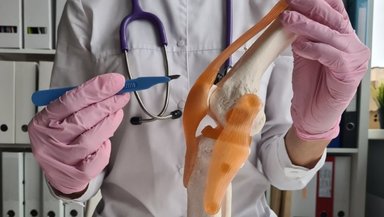Choosing the Best Implant and Surgeon for Revision Hip and Knee Replacement in India

Medicine Made Simple Summary:
Revision hip or knee replacement is a complex surgery that requires careful planning and the right expertise. For patients in India, choosing the right surgeon and implant is one of the most important decisions. This article explains what qualifications to look for in a surgeon, how to evaluate hospital facilities, and the different implant options available in India. By the end, you’ll know the key factors to consider and the right questions to ask so you can feel confident in your choice and ensure a smoother recovery.
Introduction: Why the Right Choice Matters
Revision surgery is more complex than a first-time hip or knee replacement. The outcome depends heavily on the surgeon’s expertise and the quality of the implant used. In India, where healthcare options range from government hospitals to private super-specialty centers, patients often face confusion about where to go and whom to trust. Making an informed decision about surgeon and implant selection can significantly impact recovery, cost, and long-term results.
What Makes Revision Surgery Different?
Unlike primary replacements, revision surgeries often involve removing worn-out or infected implants, repairing damaged bone, and sometimes using larger or custom implants. This makes the surgery technically challenging. Not all orthopedic surgeons perform revisions regularly, which is why specialization and experience are so important.
Qualifications to Look for in a Surgeon in India
When selecting a surgeon, patients should check for:
- MBBS + MS (Orthopedics): The basic requirement.
- Fellowship in Arthroplasty or Joint Reconstruction: Indicates advanced training.
- Membership in Indian Arthroplasty Association (IAA) or Indian Orthopaedic Association (IOA).
- Experience in Revision Surgeries: Ask specifically how many revisions they perform annually.
International training or participation in global conferences is an added advantage, as it reflects exposure to advanced techniques.
How to Evaluate a Surgeon’s Experience
Patients can evaluate surgeons by:
1. Asking about the number of revision surgeries they perform each year.
2. Checking hospital websites or Practo profiles for specialization details.
3. Looking for published research or teaching roles.
4. Reading patient testimonials and reviews online.
5. Observing communication style — a good surgeon explains clearly and welcomes questions.
A surgeon with proven experience in revisions is more likely to handle complex cases successfully.
The Role of Hospitals and Facilities in India
Not all hospitals are equipped to handle revision surgeries. Patients should look for:
- NABH or JCI accreditation (quality and safety standards).
- Access to advanced imaging and modular operation theatres.
- Availability of infection control measures.
- In-house physiotherapy and rehabilitation facilities.
Understanding Implant Options in India
India has access to a wide range of implants, both imported and locally manufactured. Common types include:
- Cemented Implants: More common in older patients with weaker bones.
- Uncemented Implants: Suitable for younger patients with strong bone quality.
- Modular and Custom Implants: Used in complex revision cases where standard implants do not fit.
- Hypoallergenic Implants: For patients with metal allergies.
Patients should ask their surgeon which implant type best suits their condition and lifestyle.
Imported vs Indian-Made Implants
Imported implants are often more expensive but come with global data and proven track records. Indian-made implants are more affordable and widely used in government and private hospitals. Both options are effective, but the choice often depends on budget, insurance coverage, and surgeon preference.
Questions to Ask About Implants
Patients should feel comfortable asking their surgeon:
- What brand and type of implant will you use?
- How long is the implant expected to last?
- Is this implant suitable for my age and activity level?
- What are the pros and cons of imported vs Indian-made implants?
- How much will the implant cost, and is it covered by insurance?
Clear answers to these questions prevent surprises and build trust.
The Indian Context: Cost and Insurance Factors
Revision surgery in India can cost anywhere between ₹2–6 lakhs, depending on the hospital, surgeon, and implant. Imported implants add to the expense, while Indian-made options lower costs. Insurance policies may cover basic implants but sometimes exclude premium or custom options. Patients should always confirm insurance coverage and ask for a detailed estimate including implant cost, hospital stay, and physiotherapy.
Checklist for Patients
1. Verify surgeon’s qualifications and fellowship training.
2. Ask about the number of revision surgeries performed annually.
3. Choose a hospital with accreditation and infection control measures.
4. Discuss implant options, costs, and insurance coverage.
5. Seek a second opinion if unsure about recommendations.
This checklist ensures patients are empowered to make informed choices.
Conclusion
If you or a loved one is considering revision hip or knee replacement in India, take time to research your surgeon and implant options. Ask questions, seek second opinions, and clarify costs upfront. The right choice today can mean a safer surgery, faster recovery, and years of improved mobility.







































